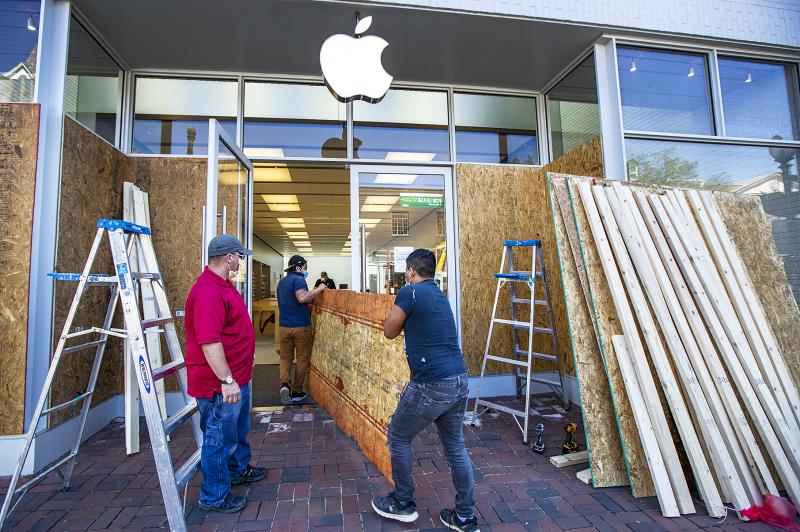Apple Inc is to reopen its biggest stores in Japan from midday tomorrow, bringing its physical retail network back online in one of its biggest markets.
Shuttered after the COVID-19 outbreak forced a series of restrictive measures across the country, Apple’s stores in the shopping districts of Omotesando, Ginza and Shibuya are all reopening their doors, with the biggest and latest outlet in Marunouchi business district joining them.
All 10 of Apple’s stores in Japan are to be open, after the company tentatively resumed sales at two of them a week earlier.

Photo: AP
Japan has weathered the COVID-19 pandemic better than most countries, lifting its state of emergency in stages last month and sending students in Tokyo back to school at the beginning of this week.
Apple has already reopened stores in Australia, Austria, Germany, South Korea and Switzerland, as well as some stores in Italy and the US.
It announced another 100 US stores would resume operations last week, although more than half of them are offering curbside pick-up services only.
In a statement confirming the original Japan openings, Apple said that stores would require temperature checks at the door, social distancing and the use of masks by customers and staff.
This is in line with requirements among local Japanese retailers such as Montbell, which turns away customers without masks.
Separately, Apple chief executive officer Tim Cook said that protections for people are “still not universally applied,” as he discussed discrimination and inequality in the US in an internal memo to employees.
Cook, who has spoken up for human rights and against inequality, made the comments on the killing of George Floyd in Minneapolis, which has sparked protests and riots across the country.
Many Apple employees have raised concerns about discrimination, according to the memo obtained by Bloomberg News.
Cook said that the company would be donating to a number of groups, including the Equal Justice Initiative, a non-profit focusing on racial injustice.
The iPhone maker would also match for employee donations two-for-one this month.
“We have to re-examine our own views and actions in light of a pain that is deeply felt, but too often ignored,” Cook said. “George Floyd’s death is shocking and tragic proof that we must aim far higher than a ‘normal’ future, and build one that lives up to the highest ideals of equality and justice.”
With protests taking place in cities across the country on Sunday, the company said that it had temporarily shuttered the majority of its US stores, citing the “health and safety” of its employees.

With an approval rating of just two percent, Peruvian President Dina Boluarte might be the world’s most unpopular leader, according to pollsters. Protests greeted her rise to power 29 months ago, and have marked her entire term — joined by assorted scandals, investigations, controversies and a surge in gang violence. The 63-year-old is the target of a dozen probes, including for her alleged failure to declare gifts of luxury jewels and watches, a scandal inevitably dubbed “Rolexgate.” She is also under the microscope for a two-week undeclared absence for nose surgery — which she insists was medical, not cosmetic — and is

CAUTIOUS RECOVERY: While the manufacturing sector returned to growth amid the US-China trade truce, firms remain wary as uncertainty clouds the outlook, the CIER said The local manufacturing sector returned to expansion last month, as the official purchasing managers’ index (PMI) rose 2.1 points to 51.0, driven by a temporary easing in US-China trade tensions, the Chung-Hua Institution for Economic Research (CIER, 中華經濟研究院) said yesterday. The PMI gauges the health of the manufacturing industry, with readings above 50 indicating expansion and those below 50 signaling contraction. “Firms are not as pessimistic as they were in April, but they remain far from optimistic,” CIER president Lien Hsien-ming (連賢明) said at a news conference. The full impact of US tariff decisions is unlikely to become clear until later this month

GROWING CONCERN: Some senior Trump administration officials opposed the UAE expansion over fears that another TSMC project could jeopardize its US investment Taiwan Semiconductor Manufacturing Co (TSMC, 台積電) is evaluating building an advanced production facility in the United Arab Emirates (UAE) and has discussed the possibility with officials in US President Donald Trump’s administration, people familiar with the matter said, in a potentially major bet on the Middle East that would only come to fruition with Washington’s approval. The company has had multiple meetings in the past few months with US Special Envoy to the Middle East Steve Witkoff and officials from MGX, an influential investment vehicle overseen by the UAE president’s brother, the people said. The conversations are a continuation of talks that

CHIP DUTIES: TSMC said it voiced its concerns to Washington about tariffs, telling the US commerce department that it wants ‘fair treatment’ to protect its competitiveness Taiwan Semiconductor Manufacturing Co (TSMC, 台積電) yesterday reiterated robust business prospects for this year as strong artificial intelligence (AI) chip demand from Nvidia Corp and other customers would absorb the impacts of US tariffs. “The impact of tariffs would be indirect, as the custom tax is the importers’ responsibility, not the exporters,” TSMC chairman and chief executive officer C.C. Wei (魏哲家) said at the chipmaker’s annual shareholders’ meeting in Hsinchu City. TSMC’s business could be affected if people become reluctant to buy electronics due to inflated prices, Wei said. In addition, the chipmaker has voiced its concern to the US Department of Commerce